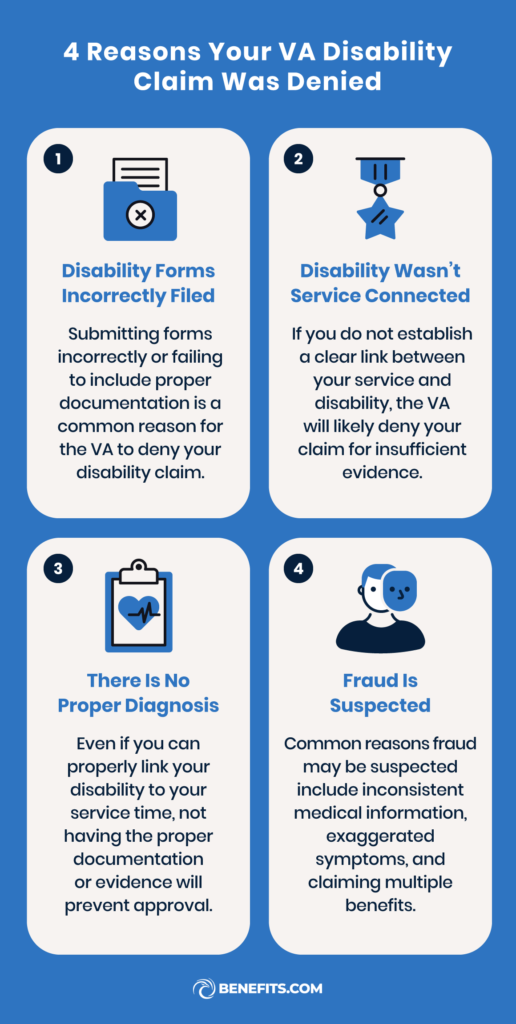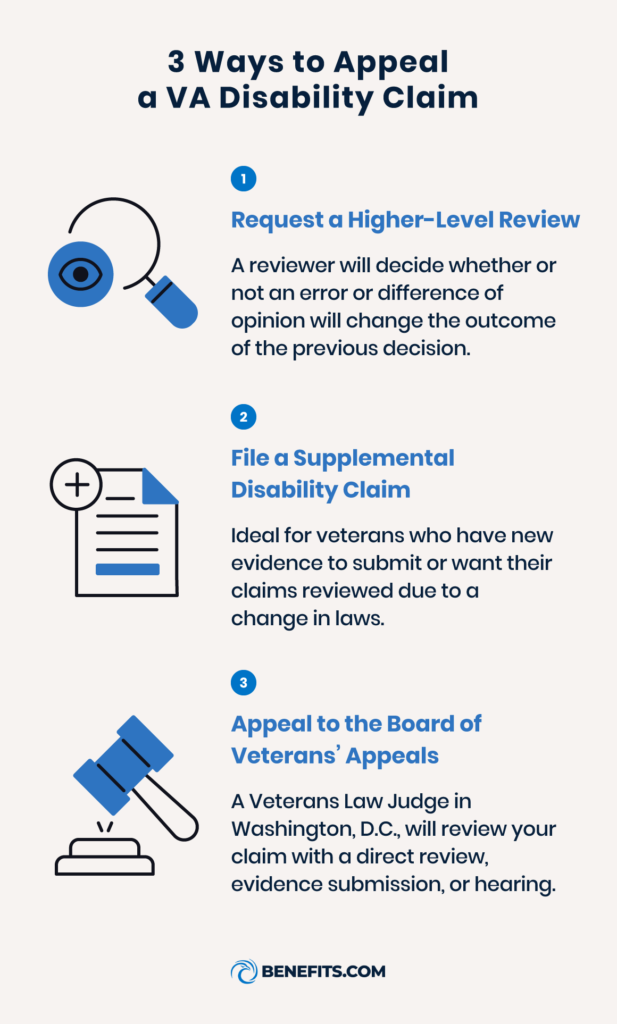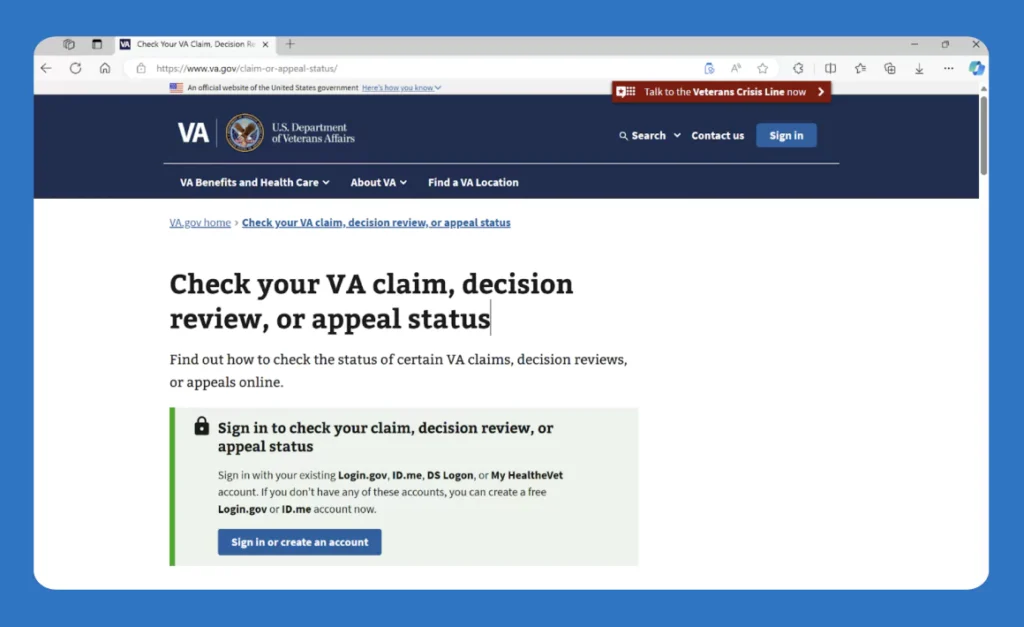Having your VA disability claim denied can be a frustrating experience. Many veterans depend on the compensation they receive from the Department of Veterans Affairs to receive health care assistance and living aid. In 2023, over 9 million individuals were enrolled in the VA health care system, with 5.6 million receiving disability compensation to help support themselves.
Our guide to VA disability claim denials will help you understand why your claim was denied, explain rejection codes, and provide options for your appeal process. We’ll also guide you on what happens after you submit an appeal, how to check its status and answer frequently asked questions about the process.
Reasons Your VA Disability Claim Was Denied
Disability claims can be denied by the VA for several reasons, from simple paperwork filing errors to more complex medical reasons. It’s critical to ensure that your disability clearly connects to your service and includes a diagnosis from a medical professional. The VA may also deny a claim if there are potential suspicions of fraud; this is one instance when a 100% total disability rating can be taken away.
If the VA denies your claim, the first step in the appeals process is understanding the reason for the denial. We’ll walk you through the most common reasons for a denial and note how you can correct the issue and appeal your claim.

Disability Forms Incorrectly Filed or Incomplete
Submitting forms incorrectly or failing to include proper documentation is a common reason for the VA to deny your disability claim. When submitting your claim to the VA, carefully read all form instructions to ensure you have included all mandated information and have confirmed its accuracy.
Be sure to double-check that any documentation you provide is correct and up to date. The VA has filing deadlines for specific claims, such as claims for Agent Orange exposure, so be sure to file your claim as soon as possible for the best possible results.
Your Disability Wasn’t Service Connected
While some conditions automatically qualify for disability benefits, for most, you must prove that your disability is linked to your service. If you do not establish a clear link between your service and disability, the VA will likely deny your claim for insufficient evidence. The VA may also deny your claim for pre-existing conditions.
Consult with a medical professional to help establish a link between your disability and service. Gather evidence of your disability, providing documentation that showcases how your service, including duties, living conditions, and specific events, may have contributed to your condition.
There Is No Diagnosis or It’s Not Credible
Not providing enough evidence is another reason the VA may deny your disability claim. Even if you can link your disability to your service time, not having the proper documentation or evidence will prevent approval. Begin by gathering medical records that back up your claim and showcase your disability. You will want to reference the Disability Benefits Questionnaire (DBQ) during this process to learn how the extent of your disability is perceived.
If you don’t currently possess the required documentation or evidence to show the connection between your disability and service, schedule a medical examination with a private physician or VA doctor. When possible, gather witness statements from fellow service members confirming your disability and service experiences.
The VA Suspects Possible Fraud
The VA may deny disability claims if they believe fraud may be at play. Common reasons fraud may be suspected include inconsistent medical information, exaggerated symptoms, and claiming multiple benefits. Falsifying medical records or witness statements is also a fraudulent offense and will result in the VA denying your claim.
If fraud has been cited as the reason for your claim rejection, contact the VA to discuss the denial and begin gathering evidence to support your case. You may need to seek legal advice from a veteran service attorney for additional assistance with your claim.
Common Claim Rejection Codes Explained
If the VA denies your disability claim, they may provide you with a claim rejection code that explains the decision. Understanding the reason for your claim rejection will help you know how to correct your submission during the appeals process. Here are the most common rejection reasons and their codes for veteran care:
VA Claim Denial Codes and Reasons For Veteran Care
| Reject Code | Reason |
|---|---|
| 002 | Place of service code is missing or invalid |
| 004 | CPT/HCPCS code is invalid or incomplete |
| 005 | NDC units are missing |
| 007 | Billing provider address is incomplete or invalid |
| 013 | Patient status is missing or invalid |
| 016 | Insured ID is missing, incomplete, or invalid |
| 021 | Patient account number is missing |
| 031 | Diagnosis code is invalid or missing |
| 034 | Claim contains ICD9 Principal Dx code |
| 081 | Rendering NPI is invalid |
| 086 | Insurance plan or program name is missing |
| 088 | Service facility address is invalid |
| 092 | Admission data is missing or invalid |
| 097 | Admission type is missing |
| 105 | Provider taxonomy code is invalid |
| 108 | Referring and attending physician NPI are equal |
| 117 | Type of bill code is invalid |
| 125 | Outpatient claim is missing admission type |
The VA also provides programs to support the family members of veterans. If the VA denied your family member care claim, you may have received a rejection code describing the reason. Here are the most common rejection codes for family member care and the reasons behind your claim’s rejection:
VA Claim Denial Codes and Reasons For Family Member Care
| Reject Code | Reason |
|---|---|
| 65/159/177 | Claim is a duplicate and has already been processed |
| 78 | Explanation of benefits from insurance is required |
| 124 | Claim has not been filled in a timely manner |
| 278 | Claim is a match of a claim previously processed |
| 148 | Chiropractic services are not covered |
| 137 | The beneficiary is not eligible based on the service date |
| 224 | Additional medical documentation is needed |
| 218/220 | Other Health Insurance Certification is required |
| 27 | The service or benefit is not covered |
| 391 | ICD diagnostic code is missing or invalid |
The 3 Best Ways to Appeal a VA Disability Claim Decision
Depending on your VA disability claim denial, multiple ways exist to file an appeal. Most veterans will want to opt for a supplemental claim, higher-level review, or board appeal to begin their appeals process. Veterans can request a clinical appeal for an additional opinion to appeal a VA medical decision.

1. Request a Higher-Level Review
Requesting a higher-level review is the appeal selection if you disagree with the VA’s decision. With a higher-level review, the reviewer will decide whether or not an error or difference of opinion will change the outcome of the previous decision. You cannot submit new evidence during a higher-level review; on average, the process can take 4 to 5 months to complete.
2. File a Supplemental Disability Claim
Supplemental claims are ideal for veterans who have new relevant evidence to submit or want their claims reviewed due to a change in laws. To file a supplemental claim, you must have had your claim denied in the past, and it must never have been contested. You must either have new evidence to submit or a recent change in law must be the basis for your new claim. The supplemental disability claim process takes around five months to complete.
3. Appeal to the Board of Veterans’ Appeals
Another option for having your claim reviewed is to appeal to the Board of Veterans Appeals. When choosing the Board of Veterans Appeals, a Veterans Law Judge in Washington, D.C., will review your claim. You must submit this claim appeal option within one year of your initial claim, supplemental claim, or higher-level review decision. When selected, there are three types of board appeals to choose from:
Direct Review: A Veteran Law Judge will review your appeal based on existing evidence. No hearing is available, and it takes an average of one year.
Evidence Submission: A Veteran Law Judge will review your appeal while considering new evidence; this process takes an average of 1.5 years.
Hearing: If you opt for a hearing, you will meet with the Veterans Law Judge, and you may add new evidence to your claim; this process can take two years.
Other Claim Appeals Processes
Other claim processes are available for veterans but are less common. You can file a clinical appeal if you disagree with your VA health care team’s decision and want another professional opinion. Alternatively, a unique appeals process exists if you disagree with a decision regarding a family caregiver program. Processes also exist for contested claims, insurance claims, and fiduciary claims.
What Happens After Appeal Submissions?
Once you send your submission to the VA, the appeal process will begin. The process will vary depending on the appeals method you select. Still, it will generally start with a review and analysis of your claim, and, in some cases, the VA will assign a Decision Review Officer to your case. Once complete, the Officer will then supply you with a Statement of Case explaining the decision.
If you opt for a Board of Veterans Appeals process, you may have the option to request a hearing or present new evidence to the Judge. Once a decision has been made, the Board of Veterans’ Appeals will issue a decision. You can appeal to the U.S. Court of Appeals for Veterans Claims if the outcome is unfavorable. If favorable, you are assigned a disability rating that matches your condition, such as 80% disability, which can grant up to $1,995.01 per month.

How to Check Your Claim Status
You can check on your claim status throughout the appeals process by logging into the VA website. Information includes any evidence you’ve submitted, your appeal type, and your updated claim. You can also use the VA website to upload additional evidence or download decision letters. We recommend contacting the VA directly if you have further questions about your appeal claim.
FAQs about Denied VA Disability Claims
At Benefits.com, we’ve been helping over 200,000 people each month get the benefits they deserve. Here are some of the most frequently asked questions we receive about VA disability claim denials:
What Percent of VA Disability Claims Are Denied?
The VA denies around 30% of the claims it receives each year. The VA may reject claims due to several factors, including forms incorrectly filed, insufficient evidence, or a lack of connection of the disability to service time. If you disagree with a VA denial, you can appeal it for a more favorable outcome.
What Are the Odds of Getting Approved for VA Disability?
The odds of getting approved for a VA disability claim vary depending on several factors, including the nature of the disability, your disability’s service connection, and provided evidence. For the best chance at approval, be sure to provide sufficient documentation and evidence from a medical professional.
How Many Times Can You Appeal a VA Denial?
You can appeal a VA claim decision up to three times. The appeals process begins with an initial appeal and can be followed up with an appeal to the Board of Veterans’ Appeals if the decision is unfavorable. If your claim is still denied, you can attempt to appeal to the U.S. Court of Appeals for Veterans Claims, which has the final say on your claim.
Can You Refile a Denied VA Claim?
Yes, you can refile a denied VA claim by selecting one of three primary options for your appeals process: a supplemental appeal, a higher-level review, or an appeal to the Board of Veterans’ Appeals. There are time limits on filing appeals, so reference your original decision for more information on deadlines and cutoff dates.
What Do I Do if My VA Disability Claim Is Denied?
If the VA denies your disability, you can file an appeal. You can request a higher-level review if you disagree with the initial decision. Otherwise, if you have new evidence to add to your case, you can file a supplemental disability claim. You can also appeal to the Board of Veterans’ Appeals for a decision made by a Veterans Law Judge.
Get Help From Benefits.com For Your Denied VA Disability Claim
You deserve to maximize your veteran’s benefits, and the team at Benefits.com is here to help make it happen. See if you qualify for 100% free assistance with your Veterans Affairs disability claim and receive expert guidance along the way. Having a VA disability claim denied is frustrating, but the Benefits.com team is here to help.
 Benefits.com Advisors
Benefits.com Advisors
With expertise spanning local, state, and federal benefit programs, our team is dedicated to guiding individuals towards the perfect program tailored to their unique circumstances.
Rise to the top with Peak Benefits!
Join our Peak Benefits Newsletter for the latest news, resources, and offers on all things government benefits.




















